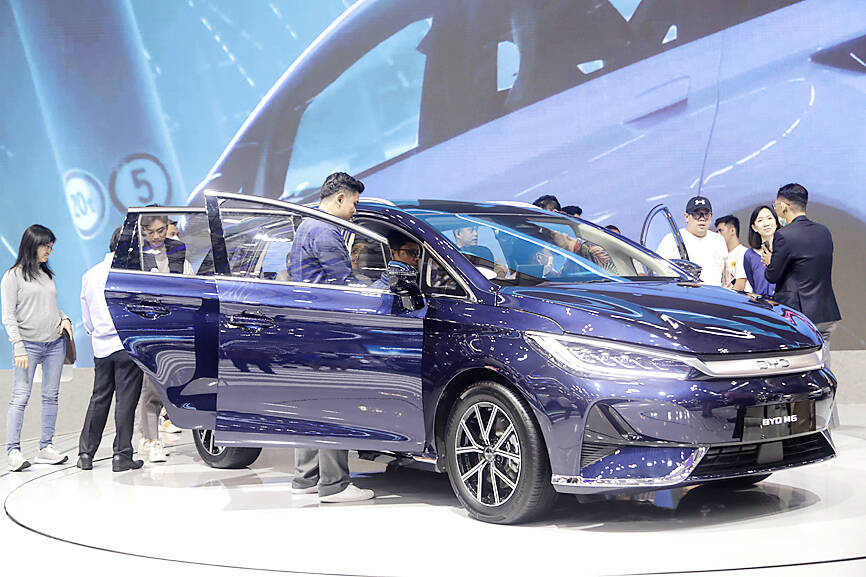A Thai investigation into discounts from China’s BYD Co (比亞迪) would continue despite a cash-back program from its distributor in response to a backlash from consumers who felt they overpaid for their electric vehicles (EV), a senior Thai official said on Friday.
Thailand, a regional auto assembly and export hub, is BYD’s largest overseas market, where it is the top-selling electric vehicle brand. BYD last month opened a factory in Thailand, its first in Southeast Asia.
Rever Automotive, BYD’s Thailand distributor, this week announced a cash-back program and discounts at charging stations until March next year.

Photo: EPA-EFE
Existing BYD customers can receive cash back of up to 50,000 baht (US$1,378) on their next purchase of the ATTO 3 or BYD Seals models from Thursday to the end of next month, Rever said in a Facebook post.
However, an investigation by the Thai Office of Consumer Protection Board would continue, with new complaints coming in, now more than 100, said Passakorn Thapmongkol, a senior official at the agency.
“We have another meeting next week so they can explain further,” said Passakorn, outlining discussions between the agency and Rever.
Rever, which has a network of more than 100 dealerships across Thailand, said the cash-back campaign was a promotion for old customers and not part of a compensation program.
BYD holds a 20 percent stake in Rever.
The issue came onto the government’s radar this month after Rever made sharp price cuts to its cars, as much as 340,000 baht for some models, triggering complaints from previous buyers of BYD EVs.
Thai Prime Minister Srettha Thavisin asked BYD chief executive officer Wang Chuanfu (王傳福) to ensure that Thai consumers were protected, to which Wang said its pricing would be appropriate.
Shenzhen-list BYD is part of a wave of Chinese automakers investing more than US$1.44 billion to set up new EV factories in Thailand, helped by government subsidies and tax incentives.
Pledged investments from other makers include Changan Auto with US$285 million.
The government aims to convert 30 percent of its 2.5 million vehicle production capacity to EVs by 2030.

South Korea’s equity benchmark yesterday crossed a new milestone just a month after surpassing the once-unthinkable 5,000 mark as surging global memory demand powers the country’s biggest chipmakers. The KOSPI advanced as much as 2.6 percent to a record 6,123, with Samsung Electronics Co and SK Hynix Inc each gaining more than 2 percent. With the benchmark now up 45 percent this year, South Korea’s stock market capitalization has also moved past France’s, following last month’s overtaking of Germany’s. Long overlooked by foreign funds, despite being undervalued, South Korean stocks have now emerged as clear winners in the global market. The so-called “artificial intelligence

NEW IDENTITY: Known for its software, India has expanded into hardware, with its semiconductor industry growing from US$38bn in 2023 to US$45bn to US$50bn India on Saturday inaugurated its first semiconductor assembly and test facility, a milestone in the government’s push to reduce dependence on foreign chipmakers and stake a claim in a sector dominated by China. Indian Prime Minister Narendra Modi opened US firm Micron Technology Inc’s semiconductor assembly, test and packaging unit in his home state of Gujarat, hailing the “dawn of a new era” for India’s technology ambitions. “When young Indians look back in the future, they will see this decade as the turning point in our tech future,” Modi told the event, which was broadcast on his YouTube channel. The plant would convert

‘SEISMIC SHIFT’: The researcher forecast there would be about 1.1 billion mobile shipments this year, down from 1.26 billion the prior year and erasing years of gains The global smartphone market is expected to contract 12.9 percent this year due to the unprecedented memorychip shortage, marking “a crisis like no other,” researcher International Data Corp (IDC) said. The new forecast, a dramatic revision down from earlier estimates, gives the latest accounting of the ongoing memory crunch that is affecting every corner of the electronics industry. The demand for advanced memory to power artificial intelligence (AI) tasks has drained global supply until well into next year and jeopardizes the business model of many smartphone makers. IDC forecast about 1.1 billion mobile shipments this year, down from 1.26 billion the prior

People stand in a Pokemon store in Tokyo on Thursday. One of the world highest-grossing franchises is celebrated its 30th anniversary yesterday.